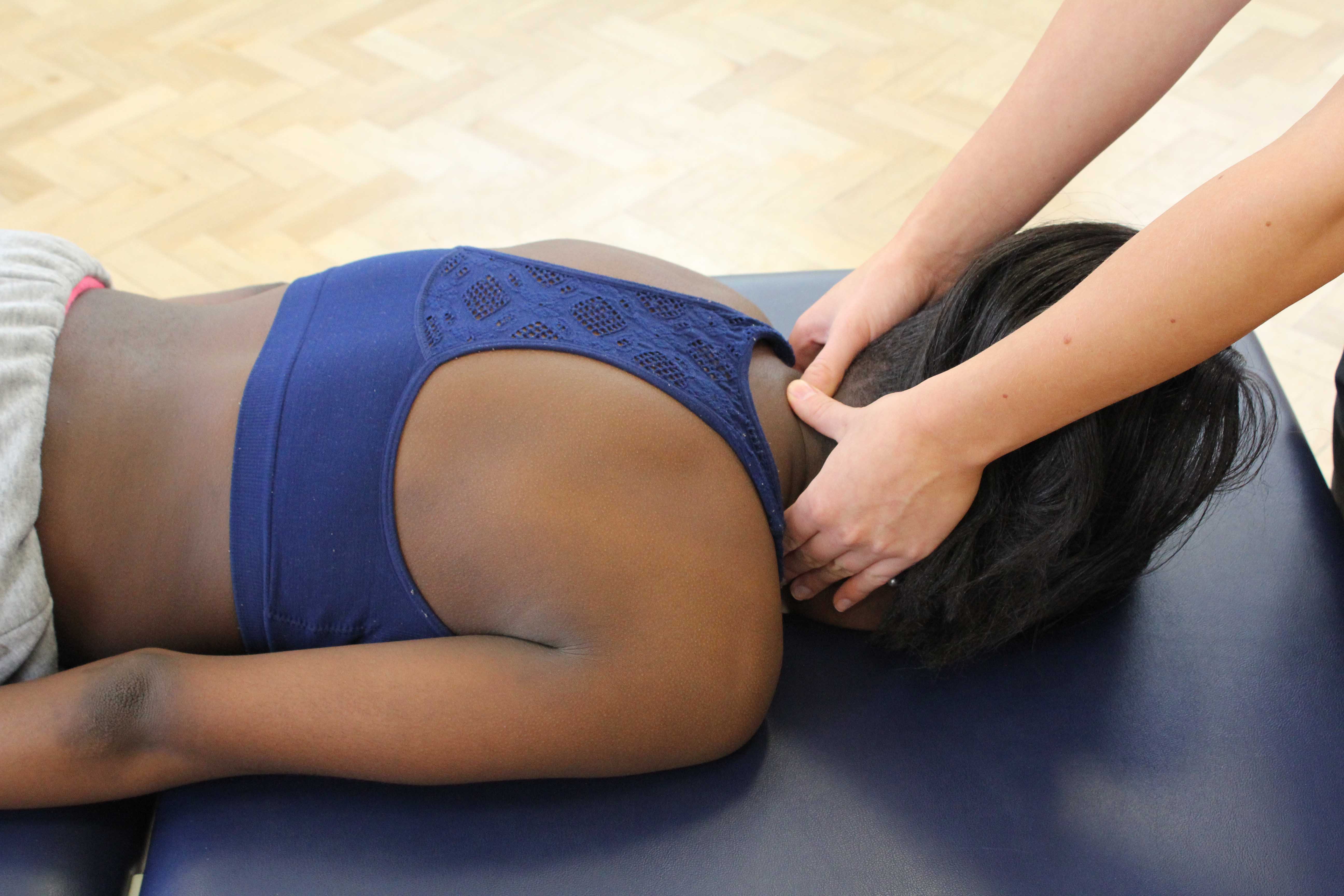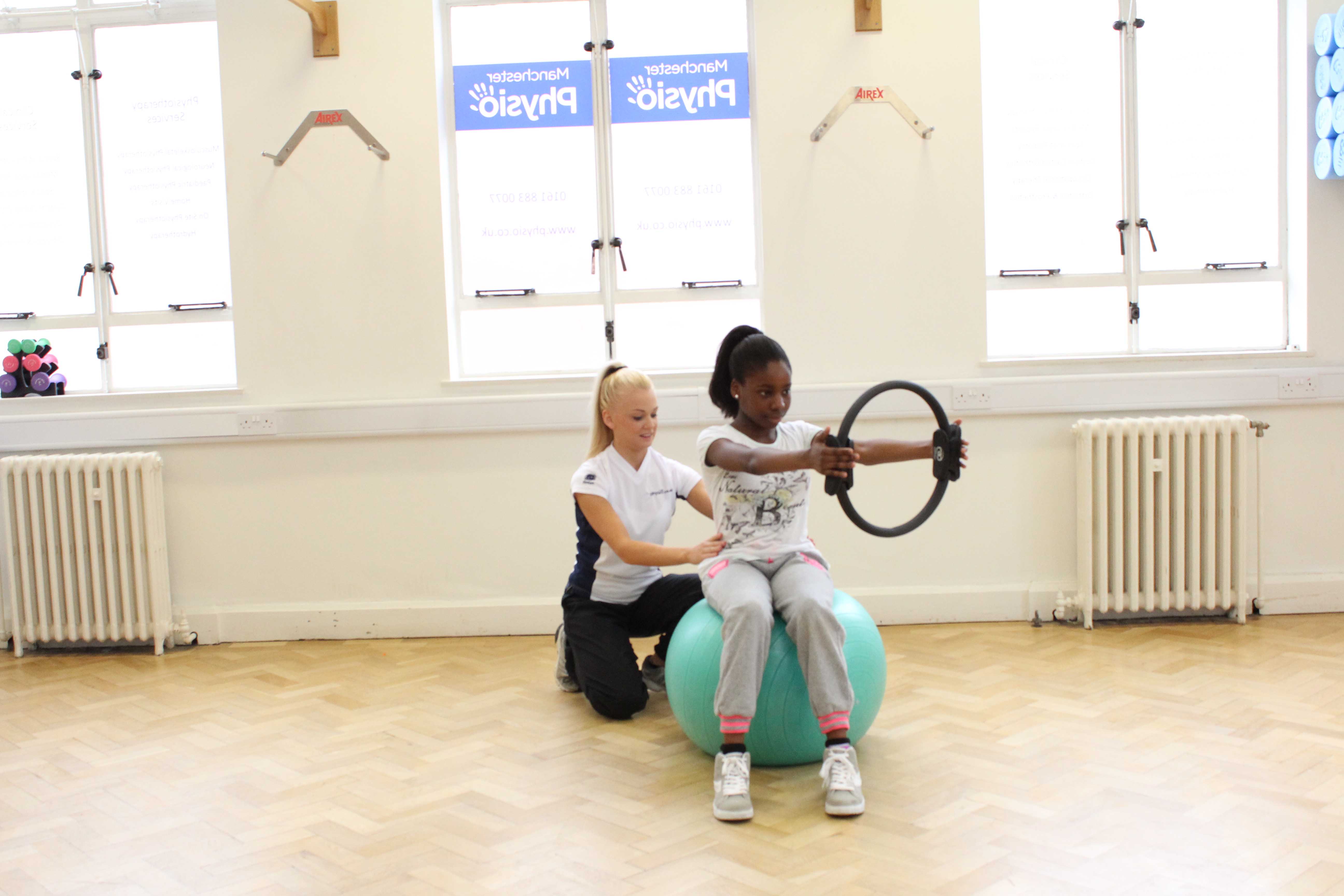What is Juvenile Arthritis?
Juvenile arthritis (also known as juvenile rheumatoid arthritis, juvenile idiopathic arthritis, juvenile chronic arthritis) affects children of all ages.
The word Arthritis refers to inflammation of joints. Arthritis causes pain, swelling, stiffness and loss of movement in joints. Juvenile arthritis is a rheumatic disease. Rheumatic arthritis can affect joints but they can also cause pain, swelling, and stiffness in muscles, ligaments and tendons. Sometimes rheumatic arthritis can affect other organs of the body. Juvenile arthritis is the most common type of arthritis that affects children.
 Above: Mobilisations of the cervical spine to relieve pain and stiffness
Above: Mobilisations of the cervical spine to relieve pain and stiffnessWhat causes Juvenile Arthritis?
The exact cause of juvenile arthritis is unknown, however, it is thought to be a combination of genetic factors (inherited), and environmental (such as a virus or infection). Juvenile arthritis is classified as a rheumatology disorder. This means that there is a problem with the child’s autoimmune system. It is thought the child’s immune system will mistakenly identify their own cells as foreign. This will then lead to an autoimmune response where the healthy cells will come under attack. This results in inflammation, heat, pain, and swelling.
What are the symptoms of Juvenile Arthritis?
The common symptoms of juvenile arthritis are; redness, swelling, warmth, stiffness, and sore joints. Many children, however, do not complain of joint pain. Juvenile arthritis can cause symptoms in any joint.
Children with juvenile arthritis can be affected very differently; symptoms may be present for a short while then disappear often to reappear again. Children with juvenile arthritis are, therefore, often said to be in periods of ‘flare up’ (inflammation stage), and ‘remission’ (no symptoms at all)
 Above: Core stability and stretching exercises supervised by a paediatric physiotherapist
Above: Core stability and stretching exercises supervised by a paediatric physiotherapistIn every child, symptoms too can vary greatly from mild to severe. The following symptoms indicate your child may have juvenile arthritis:
- Swelling in one or more joints.
- Redness in one or more joints.
- Stiffness or loss of movement of the joints (common in the morning).
- Pain in one or more joints.
- Sudden difficulty in walking, moving or using their joints.
In some less common types of juvenile arthritis symptoms are:
- Fever, loss of appetite and fatigue
- Rash
- Swollen glands.
- Eye inflammation
- In very rare occasions inflammation can happen in the linings of the heart and lungs
What should I do if my child has Juvenile Arthritis?
All children with juvenile arthritis will benefit from regular exercise and maintaining an active lifestyle as possible. You should encourage your child to participate in regular exercise, for example swimming. It may also help if you explain to your child’s school and teachers about juvenile arthritis and what implications it has for your child.
To arrange a physiotherapy appointment with Physio.co.uk where we can develop a specific exercise programme for your child, or to start a hydrotherapy programme please call us on 0330 088 7800 or book online
Physiotherapy for Juvenile Arthritis
Physiotherapy for children with juvenile arthritis is very important; physiotherapy helps to symptoms of juvenile arthritis and maintains function and movement of the joints.
The main goals of physiotherapy treatment for a child with juvenile arthritis are to maintain a high level of physical activity and a good quality of life. To achieve these goals, the physiotherapists at Physio.co.uk will provide treatments to:
- Reduce swelling
- Maintain and improve movements in the affected joints
- Relieve pain
- Identify, treat, and prevent complications.
- Educate your child about their condition
If necessary the physiotherapist may recommend splints or other orthotics to keep your child’s joints optimally positioned. The physiotherapists at Physio.co.uk are able to assess and provide splints should your child require this.
Hydrotherapy treatment is particularly useful for children with juvenile arthritis because it allows children to exercise many joints and muscles without putting weight bearing. The warmth of the hydrotherapy pool also has a therapeutic effect on reducing pain.
The physiotherapists at Physio.co.uk will be able to provide you and your child with advice regarding the best way to manage juvenile arthritis, such as:
- What sports to participate in and what sports are to be avoided.
- Advice regarding heat therapy to ease pain.
- When to rest and when to exercise.
- What to do in a ‘flare up’ of juvenile arthritis.
Does Juvenile Arthritis have any long-term effects?
It is impossible to predict how long juvenile arthritis will affect your child. Some children recover quickly after a couple of months, whereas others may suffer with juvenile arthritis for years. However, most children will be able to lead a normal life and will go into adulthood fully recovered.
In most cases of juvenile arthritis children will recover with few long-term problems, over 70% of children recover with no ongoing problems. However, in more serious cases of juvenile arthritis some children experience problems throughout adolescence and into adulthood from ongoing arthritis or damaged / deformed joints.
The ‘flare ups’ and ‘remissions’ involved in juvenile arthritis are also different in each child. Some children may only have one or two flare ups and never have symptoms again, whereas other children may experience many flares or even have symptoms that do not resolve.
Physio.co.uk are able to treat your child to minimise any long term effects of juvenile arthritis from damaged joints. To arrange an appointment with one of our physiotherapist please 0330 088 7800, or book online

 0330 088 7800
0330 088 7800


































